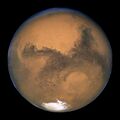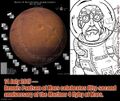Template:Selected anniversaries/July 14: Difference between revisions
From Gnomon Chronicles
No edit summary |
No edit summary |
||
| (24 intermediate revisions by the same user not shown) | |||
| Line 1: | Line 1: | ||
<gallery> | <gallery> | ||
|| *** DONE: Pics *** | |||
|| *** Pareidolia: Military Intelligence *** | |||
||1671 | ||1671: Jacques d'Allonville born ... astronomer and mathematician. Pic search: https://www.google.com/search?q=Jacques+d%27Allonville | ||
||George Green | ||1793: George Green born ... mathematical physicist who wrote ''An Essay on the Application of Mathematical Analysis to the Theories of Electricity and Magnetism'' (Green, 1828). The essay introduced several important concepts, among them a theorem similar to the modern Green's theorem, the idea of potential functions as currently used in physics, and the concept of what are now called Green's functions. Green was the first person to create a mathematical theory of electricity and magnetism and his theory formed the foundation for the work of other scientists. Pic search good: https://www.google.com/search?q=george+green+(mathematician) | ||
||Jean Baptiste André Dumas | ||1800: Jean Baptiste André Dumas born ... chemist, best known for his works on organic analysis and synthesis, as well as the determination of atomic weights (relative atomic masses) and molecular weights by measuring vapor densities. Pic. | ||
||1827 | ||1827: Augustin-Jean Fresnel dies ... physicist and engineer. Pic. | ||
File:Charles Hermite circa 1901.jpg|link=Charles Hermite (nonfiction)|1856: Mathematician [[Charles Hermite (nonfiction)|Charles Hermite]] is elected to fill the vacancy created by the death of Jacques Binet in the Académie des Sciences. | File:Charles Hermite circa 1901.jpg|link=Charles Hermite (nonfiction)|1856: Mathematician [[Charles Hermite (nonfiction)|Charles Hermite]] is elected to fill the vacancy created by the death of Jacques Binet in the Académie des Sciences. | ||
|| | ||1865: Benjamin Gompertz dies ... mathematician and statistician. Pic search good: https://www.google.com/search?q=benjamin+gompertz | ||
|| | ||1868: Gertrude Bell born ... archaeologist and spy. Pic. | ||
|| | ||1872: Albert Marque born ... sculptor and doll maker. DOD unknown. Pic: https://commons.wikimedia.org/wiki/File:Albert_Marquet_(1875-1947),_c._1920s.jpg | ||
|| | ||1874: André-Louis Debierne born ... chemist and is considered the discoverer of the element actinium. In 1910, he and Marie Curie prepared radium in metallic form in visible amounts. Pic. | ||
|| | ||1894: Guido Kark Heinrich Hoheisel born ... mathematician. Pic. | ||
|| | ||1899: Gregory Breit born ... physicist and academic. During the early stages of the war, Breit was chosen by Arthur Compton to supervise the early design of the first atomic bomb during an early phase in what would later become the Manhattan Project. Breit resigned his position in 1942, feeling that the work was going too slowly and that there had been security breaches on the project; his job went to Robert Oppenheimer, who was later appointed to scientific director of the entire project. Pic. | ||
|| | File:Hans_Bernd_Gisevius.jpg|link=Hans Bernd Gisevius (nonfiction)|1904: German diplomat and intelligence officer [[Hans Bernd Gisevius (nonfiction)|Hans Bernd Gisevius]] born. Gisevius will be covert opponent of the Nazi regime, and a radical communist; he will serve as a liaison in Zürich between Allen Dulles, station chief for the American OSS, and the German Resistance forces in Germany. | ||
|| | ||1905: Laurence Chisholm Young born ... mathematician known for his contributions to measure theory, the calculus of variations, optimal control theory, and potential theory. Pic. | ||
|| | ||1907: William Henry Perkin dies ... chemist and entrepreneur best known for his serendipitous discovery of the first synthetic organic dye, mauveine, made from aniline. Though he failed in trying to synthesise quinine for the treatment of malaria, he became successful in the field of dyes after his first discovery at the age of 18. Pic. | ||
|| | ||1911: Gertrude Scharff Goldhaber born ... nuclear physicist. Goldhaber studied neutron-proton and neutron-nucleus reaction cross sections in 1941, and gamma radiation emission and absorption by nuclei in 1942. Around this time she also observed that spontaneous nuclear fission is accompanied by the release of neutrons — a result that had been theorized earlier but had yet to be shown. Pic. | ||
|| | ||1911: Harry Atwood, an exhibition pilot for the Wright brothers, lands his airplane at the South Lawn of the White House. He is later awarded a Gold medal from U.S. President William Howard Taft for this feat. Pic. | ||
|| | ||1917: Patrick Alfred Pierce Moran born ... statistician who made significant contributions to probability theory and its application to population and evolutionary genetics. Pic. | ||
||1918: Jay Wright Forrester born ... computer engineer and systems scientist. He was a professor at the MIT Sloan School of Management. Forrester is known as the founder of system dynamics, which deals with the simulation of interactions between objects in dynamic systems. Pic. | |||
||1921: Geoffrey Wilkinson born ... chemist and academic, Nobel Prize laureate ... who pioneered inorganic chemistry and homogeneous transition metal catalysis. Pic. | |||
||1933: Stephen Schanuel born ... mathematician working in the fields of abstract algebra and category theory, number theory, and measure theory. He stated a conjecture in the field of transcendental number theory, which remains an important open problem to this day. Schanuel was a professor emeritus of mathematics at University at Buffalo. Pic: http://rfcwalters.blogspot.com/2014/11/stephen-h-schanuel-and-dietmar.html | |||
||1933: Gleichschaltung: In Germany, all political parties are outlawed except the Nazi Party. | |||
||1933: The Nazi eugenics begins with the proclamation of the Law for the Prevention of Hereditarily Diseased Offspring that calls for the compulsory sterilization of any citizen who suffers from alleged genetic disorders. | |||
||1948: Harry Brearley dies ... was an English metallurgist, usually credited with the invention of "rustless steel" (later to be called "stainless steel" in the anglophone world). Pic. | |||
||1953: Richard Edler von Mises dies ... scientist and mathematician who worked on solid mechanics, fluid mechanics, aerodynamics, aeronautics, statistics and probability theory. Pic. | |||
||1954: Thomas Wolff born ... mathematician, working primarily in the fields of harmonic analysis, complex analysis, and partial differential equations. Pic. | |||
File:Small Boy nuclear test 1962.jpg|link=Small Boy (nuclear test) (nonfiction)|1962: United States Army tests [[Small Boy (nuclear test) (nonfiction)|Small Boy, a tactical nuclear weapon]], at the Nevada Test Site. Yield was 1.65 kt. | File:Small Boy nuclear test 1962.jpg|link=Small Boy (nuclear test) (nonfiction)|1962: United States Army tests [[Small Boy (nuclear test) (nonfiction)|Small Boy, a tactical nuclear weapon]], at the Nevada Test Site. Yield was 1.65 kt. | ||
File: | File:Mars 23 aug 2003 hubble.jpg|link=Mars (nonfiction)|1965: The Mariner 4 flyby of [[Mars (nonfiction)|Mars]] takes the first close-up photos of another planet. | ||
||1980: Felix Berezin dies ... mathematician and physicist known for his contributions to the theory of supersymmetry and supermanifolds as well as to the path integral formulation of quantum field theory. Pic: https://ru.wikipedia.org/wiki/%D0%91%D0%B5%D1%80%D0%B5%D0%B7%D0%B8%D0%BD,_%D0%A4%D0%B5%D0%BB%D0%B8%D0%BA%D1%81_%D0%90%D0%BB%D0%B5%D0%BA%D1%81%D0%B0%D0%BD%D0%B4%D1%80%D0%BE%D0%B2%D0%B8%D1%87 | |||
||1992 | ||1992: 386BSD is released by Lynne Jolitz and William Jolitz beginning the Open Source operating system revolution. Linus Torvalds releases his Linux soon afterwards. | ||
|| | ||1996: Kenneth Tompkins Bainbridge dies ... physicist at Harvard University who did work on cyclotron research. His precise measurements of mass differences between nuclear isotopes allowed him to confirm Albert Einstein's mass-energy equivalence concept. He was the Director of the Manhattan Project's Trinity nuclear test, which took place July 16, 1945. Bainbridge described the Trinity explosion as a "foul and awesome display". He remarked to J. Robert Oppenheimer immediately after the test, "Now we are all sons of bitches." Pic. | ||
|| | ||2000: Sir Marcus Laurence Elwin "Mark" Oliphant dies ... physicist and humanitarian who played an important role in the first experimental demonstration of nuclear fusion and also the development of nuclear weapons. Pic. | ||
||2015 | ||2015: NASA's ''New Horizons'' probe performs the first flyby of Pluto, and thus completes the initial survey of the Solar System. | ||
||2017: Maryam Mirzakhani dies ... mathematician and a professor of mathematics at Stanford University. Her research topics included Teichmüller theory, hyperbolic geometry, ergodic theory, and symplectic geometry. Pic. | |||
File:Dennis Paulson of Mars (14 July 2017).jpg|link=Dennis Paulson of Mars|2017: ''[[Dennis Paulson of Mars]]'' celebrates fifty-second anniversary of the Mariner 4 flyby of Mars. | |||
</gallery> | </gallery> | ||
Latest revision as of 11:09, 7 February 2022
1856: Mathematician Charles Hermite is elected to fill the vacancy created by the death of Jacques Binet in the Académie des Sciences.
1904: German diplomat and intelligence officer Hans Bernd Gisevius born. Gisevius will be covert opponent of the Nazi regime, and a radical communist; he will serve as a liaison in Zürich between Allen Dulles, station chief for the American OSS, and the German Resistance forces in Germany.
1962: United States Army tests Small Boy, a tactical nuclear weapon, at the Nevada Test Site. Yield was 1.65 kt.
1965: The Mariner 4 flyby of Mars takes the first close-up photos of another planet.
2017: Dennis Paulson of Mars celebrates fifty-second anniversary of the Mariner 4 flyby of Mars.





